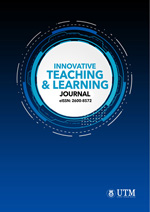Effect of Blended Learning using the Station Rotation Model towards Students’ Achievement in Learning Chemistry
Abstract
Modern educational technology is continuously evolving due to the widespread access to internet and advancements in information and communication technology (ICT). Modern educational technology can enhance student-teacher development in learning and solve educational problems by using innovative teaching approaches such as blended learning. This research investigated the effectiveness of the blended learning using station rotation model towards the students’ achievement in learning chemistry. This study employed a quantitative research design, utilizing pre-experimental use of one-group pre and post-test design. The sample consisted of 17 Form 4 students who were taking chemistry subject from one school in Johor Bahru. The pre- and post-test were developed to assess students’ achievement in learning chemistry. The findings showed there are significance differences in students’ achievement after the intervention using Blended Learning type of Station Rotation Model. This shows that there is a positive influence on students after the engaged learning activities. In conclusion, it is expected that this study can assist high school teachers in designing effective blended learning in learning chemistry.
















